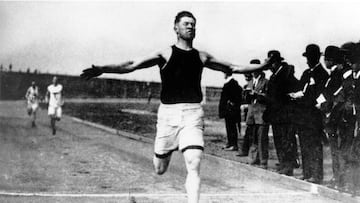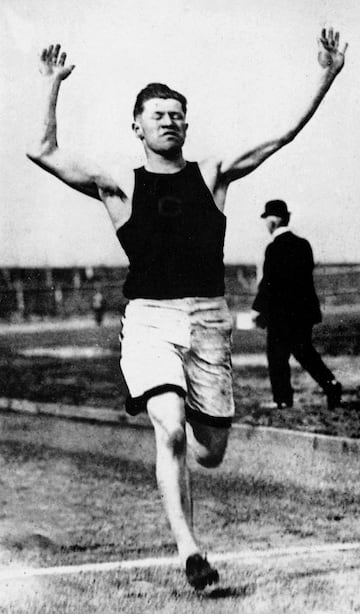Who was Jim Thorpe and why did he lose his gold medals in the 1912 Olympics?
The International Olympic Committee has finally reinstated the two gold medals that Jim Thorpe won over a hundred years ago in the 1912 Olympics, rounding out the story of one of the greatest athletes ever.

There was not, there is not and there will never be anyone like Jim Thorpe, the American athlete born in Oklahoma in 1887. His legacy is so special, so vast, that even now, almost 70 years after his death in 1953, he is still making history. Thorpe won two olympic gold medals in 1912, he was stripped of them by the IOC in 1913 due to “breaking amateurism rules”, and only now has he finally gotten back what he conquered by being “the greatest athlete in the world”.
Thorpe, the legend
Jim Thorpe was born to parents of mixed-race ancestry who raised him in the Roman Catholic faith, he had a difficult childhood in which his mother and twin brother died and he decided to leave his home. Once he came back, even after losing his father as well, he started his sports career by enrolling at college in Carlisle. Starting in 1907, he took part in football, baseball, lacrosse and even won an intercollegiate ballroom dancing contest, as well as track and field competitions. He gained fame due to his heroics in football, as he led his team to a 11-1 record in 1911, playing both in offense and defense, and even special teams. He was named 1st team All-American in 1911 and 1912, seasons in which he was mostly focused in that sport.
He started training for the 1912 Sweden Olympics during the spring of that same year, which landed him his greatest achievements with those pentathlon and decathlon gold medals. After coming back from Europe, even amid all the controversies, he jumped into his professional career, joining the MLB National League champions New York Giants, with whom he won another pennant and toured the world, getting to meet a Pope and increasing the interest in the sport even if he did not get to play that much and ended up bouncing between teams, with a .252 average in 289 games over a decade.

But Thorpe had not abandoned the sport that had given him the spotlight, as he also played and won championships for the Canton Bulldogs of the American Professional Football Association before it became the NFL in 1920. He both played and coached in the league for the next decade, achieving First Team All-Pro honors in 1923. Even if not as well documented, there are newspaper stories with information about Thorpe getting to play basketball and even hockey at, or near, the professional level too.
The 1912 Olympics, win and loss
During his track and field college career, Thorpe had enough success to take part in the trials held in New York in 1912, where his multiple abilities earned him a spot for the Olympics in Sweden. He decided to train in multiple disciplines, such as jumps, hurdles, pole vaulting or javelin, as two new events were being added to that edition of the Olympics, the pentathlon and the decathlon. He qualified for both.
He also competed in high jump and long jump once the Olympics came, finishing fourth and seventh respectively, but his first golden success came in the pentathlon, as he won four events and was clearly the best in the field. Next came the decathlon, in which he dismantled local favorite Hugo Wieslander by placing in the top four in all events and getting a score 8,413 which would stand as the Olympic record for almost two decades. He was presented his gold medals by Czar Nicholas II and King Gustav V of Sweden, who congratulated him with those words: “you, sir, are the greatest athlete in the world”. Thorpe was reported to have simply answered “thanks, King”, before sneaking out of the ceremony.

He did not participate in the Olympics ever again, since he went into professional sports and that prohibited him from doing so. That specific rule is also the one that created the whole affair due to which he was stripped of his gold medals for over a hundred years. In January 1913 a newspaper reported that Thorpe had actually played for money in minor league baseball during a couple of summers before his Olympics appearance, which would make it illegal for him to be part of the event.
The Amateur Athletic Union decided to strip his amateur status retroactively, even with the public’s displeasure and a letter from Thorpe explaining he had not known about the rule and had had no ill intent. Most college athletes played professionally during the summers, but they used an alias to retain amateur eligibility, which Thorpe did not. The International Olympic Committee did not need much time to strip Thorpe of all his achievements, without even giving him time to protest.
A golden legacy regained
Thorpe went on to have a life full of achievements and landmarks, not only in sports but by working in the movies when he needed a job, being an extra or a minor character in different shows. Burt Lancaster ended up starring in a biopic about his life in 1951, short before the athlete’s death. In 1982 the IOC decided to give replica gold medals to Thorpe’s family, but he was not reinstated as the winner of any event then.
It has been a long and shared effort which has allowed Thorpe to recover his gold medals in 2022, as both the Norwegian and Swedish Olympic Committees had to accept the ruling of giving back their titles to Thorpe. These organisms did so because neither of their athletes had thought of themselves as the rightful winners of the pentathlon or decathlon winners when they were alive, accepting Thorpe as the gold medalist. With this amendment of the history books, the journey of Jim Thorpe, an athlete that inspired millions, gets a golden end.






